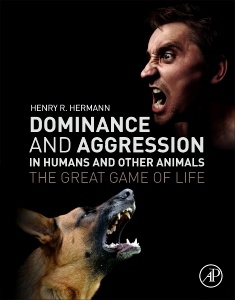Dominance and Aggression in Humans and Other Animals The Great Game of Life
Auteur : Hermann Henry R.

Dominance and Aggression in Humans and Other Animals: The Great Game of Life examines human nature and the influence of evolution, genetics, chemistry, nurture, and the sociopolitical environment as a way of understanding how and why humans behave in aggressive and dominant ways. The book walks us through aggression in other social species, compares and contrasts human behavior to other animals, and then explores specific human behaviors like bullying, abuse, territoriality murder, and war. The book examines both individual and group aggression in different environments including work, school, and the home. It explores common stressors triggering aggressive behaviors, and how individual personalities can be vulnerable to, or resistant to, these stressors. The book closes with an exploration of the cumulative impact of human aggression and dominance on the natural world.
Chapter 1. Defining Dominance and Aggression
Chapter 2. Traits of Dominant Animals
Chapter 3. The Significance of Comparative Studies
Chapter 4. Social Nonprimate Animals
Chapter 5. From Whence We Came: Primates
Chapter 6. The Human Animal
Chapter 7. Similarities Between Humans and Other Living Organisms
Chapter 8. Human Nature
Chapter 9. Alternate Human Behavior
Chapter 10. The Chemical, Physical, and Genetic Nature of Dominance
Chapter 11. Dominance and Aggression in the Workplace
Chapter 12. Dominance in Religion
Chapter 13. Dominance in Politics
Chapter 14. Human Aggression: Killing and Abuse
Chapter 15. Killing Humans
Chapter 16. Are We Our Own Worst Enemy?
Chapter 17. Attempts to Save the Natural World
Chapter 18. The Nature of Things
- Reviews the influence of evolution, genetics, biochemistry, and nurture on aggression
- Explores aggression in multiple species, including insects, fish, reptiles, birds, and mammals
- Compares human and animal aggressive and dominant behavior
- Examines bullying, abuse, territoriality, murder, and war
- Includes nonaggressive behavior in displays of respect and tolerance
- Highlights aggression triggers from drugs to stress
- Discusses individual and group behavior, including organizations and nations
- Probes dominance and aggression in religion and politics
- Translates the impact of human behavior over time on the natural world
Date de parution : 10-2016
Ouvrage de 396 p.
21.4x27.6 cm
Thèmes de Dominance and Aggression in Humans and Other Animals :
Mots-clés :
Abortion; Abuse; Aggregations; Aggression; Aggressiveness; Alternate behavior; Altruism; Animal cruelty; Animal waste; Antiscience; Antisocial behavior; Apes; Backbiting; Behavior; Biogeochemistry; Brain structure and function; Brain; Bullies; Chemicals; Child abuse; Chordates; Civilization; Dead zone; Deception; Diversification; Domestic animals; Dominance hierarchies; Dominance; Dominant nature; Earth; Ecosystem; Environmental homeostasis; Eusociality; Evolution; Extinction; Fertilizer; Fishin


